- Home
- Patricia MacLachlan
Baby Page 2
Baby Read online
Page 2
My father’s voice wavered as he read.
“This is Sophie. She is almost a year old and she is good.”
Sophie. At the sound of her name the baby looked up at him and stopped crying. Papa stared at her for a moment. He swallowed, then continued. Lalo pulled me behind him, and as we came closer Sophie turned to look at us. One of her hands went up to rub her ear.
“I cannot take care of her now, but I know she will be safe with you,” Papa read. “I have watched you. You will be a good family. I will lose her forever if you don’t do this, so please keep her. I will send money for her when I can. I will come back for her one day. I love her.”
Lalo still held my hand. Papa looked at Mama.
“She spelled please wrong,” he said, his voice soft.
Lalo held out his hand to Sophie in Byrd’s arms. Sophie stared, then reached out her hand to touch his. Lalo smiled. A small satisfied sound came from Sophie, and she began to move his hand up and down, staring at him as if waiting for something familiar. Lalo took Sophie’s other hand and moved it up and down and suddenly, for the first time, Sophie smiled.
Papa turned to Mama, as if Sophie’s smile had given him energy.
“Call the police,” he said.
Byrd took a breath, almost a gasp.
“We have to report this,” said Papa quickly. “This child has been left. This is a criminal act.”
Sophie sucked in her breath, imitating Byrd.
Mama didn’t answer. She held out her arms to Sophie, and Sophie looked at her steadily, thoughtfully.
“Sophie?” said Mama softly.
She crooned the name, like a lullaby.
Sophie watched Mama. She put two fingers in her mouth; then, after a moment, she took them out.
“Sophie,” she repeated, her voice clear and high like a bell.
She lunged toward Mama then, nearly falling out of Byrd’s arms. Mama’s arms went around her.
“Lily.” Papa’s voice was loud. “We need to talk inside. Alone, without the baby.”
“Without Sophie, John,” Mama corrected him.
“Without Sophie,” said Papa slowly.
“Sophie,” repeated Sophie in her small voice.
Mama smiled and so did Byrd, and they looked at each other as if there were a secret between them, something we didn’t know.
“Here,” said Mama, handing over Sophie to Byrd. “I’m going inside to speak about criminal acts.”
“Oh, boy,” whispered Lalo beside me. “Oh, boy.”
It was quiet outside, warm and peaceful. No clouds cluttered up the sky. Lalo and I sat in the grass with Sophie, playing patty-cake.
“She knows how,” said Lalo with an amazed smile.
“All babies know how,” said Byrd. She looked at me. “Someone who loves them always teaches them.”
She sat on the steps in her dress and fancy stockings watching Sophie and trying to pretend that there were no sounds of loud voices coming from inside. We could hear Papa’s voice, strong and sometimes fierce, then Mama’s, that sweet soft way of talking she had when she was serious and angry, like a steady hum.
All of a sudden the voices stopped and the silence made us look up. The door opened. Mama came out first, then Papa. Papa looked tired, the way he looked when he had finished his nightly tap dancing.
Byrd stood up and stared at Mama. Sophie turned and put out one arm toward Mama.
“She will stay with us for a while,” said Mama softly.
“Until we can come to some civilized agreement about what to do,” said Papa firmly.
Byrd smiled. Papa sat down on the porch steps wearily.
“Oh, boy,” said Lalo for the third time.
Byrd lifted Sophie and whirled her around until Sophie laughed. A small island plane flew over our heads and away. And Byrd’s pearls broke, showering Sophie and falling over the meadow grasses like tears.
chapter 4
It was night, Sophie’s first night with us. Moonlight was sliding slowly across my quilt like the tide when I heard her first whimper. There was the scurry of feet, a door opening, then closing, my mother’s soft, soothing voice. I turned over and lay looking out the window. Stars were tossed across the sky, a moon nearly full with a small slice off one side. Sophie cried harder, and then a door opened and closed again. I raised my head off the pillow and listened. A new sound came up the stairs. The crying stopped, but I knew the new sound well. I got up and went to the door, opening it. A night-light lighted the hallway. I walked down the cool wood floor, down the stairs, and stopped, my hand on the newel post. One lamp glowed in the living room. Mama sat on the floor holding Sophie. Sophie’s face was tear streaked, a sleep line across one cheek. But she stared at my father, her mouth open. His hair was rumpled and his eyes dark circled. He was dressed in pajamas and tap shoes, and he danced on the tiled table. Mama sang along with him.
Boys and girls together.
Me and Mamie O’Rorke
Tripped the light fantastic
On the sidewalks of New York.
Papa ended and Mama clapped for him. Sophie still stared at him, her mouth open. Papa got down off the table and Sophie began to clap too.
“Mo,” she said. “Mo.”
“More,” explained Mama.
Papa sighed.
“I know what mo means, Lily,” he said grumpily.
He looked over and saw me sitting on the lowest step of the stairway.
“I know what mo means,” he repeated.
He smiled at me suddenly and I smiled back. We were thinking of all the times that Papa danced for me; all the nighttime songs when I was sick, and how hard he had tried to teach me the soft shoe that I couldn’t learn.
Sophie yawned, and Mama stood up with her. Sophie laid her head on Mama’s shoulder.
“Thank you,” Mama whispered to Papa.
She walked past me on the stairway. Sophie’s eyes were already closed.
Papa sighed and walked to the screen door, opening it, walking out onto the porch. I followed him.
He sat on the porch steps. I sat next to him.
“Stars,” he said to me.
I nodded. I knew that talk of the stars was in place of things we would not say.
“Milky Way,” I said. I pointed. “The Pleiades.”
Papa put his arm around me.
“Has anyone asked you what you think about all of this?”
“Mama doesn’t ask those things,” I said to him sharply. “Not anymore.” The sound of anger in my voice surprised me.
“No,” his voice was soft. “But I am asking.”
“I never had—” I stopped. “I never had a sister,” I said slowly. I looked up at Papa and knew that we were both thinking about something else. Someone else.
“That’s not the question, Lark,” said Papa softly.
Insects buzzed in the grass. A gull cried far away over the water.
“I like Sophie,” I said. “I don’t love her.”
“Don’t,” said Papa. “Don’t love her.”
He sighed.
“I like her too,” he said after a moment.
“Mama will love her soon,” I whispered.
“If not already,” murmured Papa.
“I’m scared,” I said after a while. “For Mama.”
There was a silence.
“Yes,” said Papa. “But it is not your job to protect her.”
I looked up at Papa.
“Is it your job?” I asked.
Papa didn’t speak for a moment.
“Not if she won’t let me,” he said.
We sat for a long time then, watching clouds fall over the moon like nets. After a while I knew there weren’t any more words. Not now. I got up and went inside, up the stairs to bed. Soon, just before I fell asleep, I heard the sound downstairs of ice in a glass and then, like messages, my father’s dancing. I listened half the night to his taps on the tiles as the moon moved across the sky and away.
“So?” sa
id Lalo at the door. He grinned his crazy morning grin. He probably slept smiling.
My eyes squinted against the hard morning light.
“In the kitchen,” I said.
Lalo walked past me. I stood, looking out into the sunlight. Then I slammed the door.
“Good morning to you too,” I said, my voice so loud that I surprised myself.
“Hi, Larkin,” he called to me over his shoulder before he disappeared into the kitchen.
“So, Sophie!” I heard him say. “It’s Lalo!”
I heard Sophie’s delighted “La.”
I walked into the kitchen and leaned against the counter. Morning sun came in, pouring over Mama’s glass bottles in the window. Byrd sat in her velvet bathrobe, the wrinkles on her face like etched glass in the sunlight. Papa drank orange juice as he read the newspaper. Sophie sat in my old high chair, cereal on her face. She grinned at me suddenly.
“La!” she called, holding out her spoon for me.
I couldn’t help smiling back at her. Her tiny neat rows of teeth looked like seed pearls in one of Byrd’s brooches. And it came to me, then, like the sudden sharp pain in my chest when I swam too fast, that I was not only scared for Mama, I was scared for me. I looked at Papa and he stared back at me. His look was almost like a warning that said, Don’t, Lark. Don’t.
Lalo saw Papa’s expression and his smile faded.
I turned and went out of the kitchen and out onto the porch where there was space. I walked down the steps and out onto the lawn, but I could still hear Sophie’s high, happy voice. After a moment I went down past the pond and through the fields to the small cemetery that sat on a hill by the water where all I could hear was the sound of the sea and the wind. A tiny stone sat there, surrounded by big headstones with angels and flowers and names engraved on them. There was no name on the tiny stone, just the word BABY and a date that showed that the one buried there had only lived for one day. I felt a movement beside me, and Lalo was there.
“So, Larkin,” Lalo began, his voice thin, the words almost blowing away in the wind.
I shook my head. I wanted to talk, but Lalo and I had talked about this many times. It was Mama and Papa I wanted to talk with, but Mama and Papa didn’t talk. Not about this.
Beside me Lalo sighed. The wind rippled the unmown grasses. And we stood, silently looking down at the stone that marked the grave of my baby brother.
Most of all she remembered the man. His hands, strong, brown. She could feel the rumble in his chest when he held her, the sound of song coming up through him and surrounding her, making her smile. Even now she smiled at the thought of it. Sometimes in a crowd of people she would hear a voice, turn, look for him. It was not so much his face she looked for.
It was his hands she remembered.
chapter 5
Rock, paper, scissors. Papa tried to teach Sophie the game. They sat on the porch, Sophie in his lap, as Papa held out his hands time after time.
“Rock, paper, see paper, Sophie? Scissors?”
Papa knew she was too young. She couldn’t know that paper covered rock, rock crushed scissors, scissors cut paper, but Papa didn’t care. Neither did Sophie. There was something about Papa’s hands she liked, watching them form rock, paper, scissors. He hid his hands behind his back, and it was not what shape the hands took when they came out of hiding, it was his hands, no matter what, that Sophie liked.
“Mo,” said Sophie.
My mother smiled from the porch swing.
“We should teach her words,” she said. “Hands, Sophie. Hands.”
“Mo,” said Sophie, frowning at her.
Papa laughed at the frown and Sophie laughed, too, the sound like water falling over rocks.
“Papa,” said my mother. “Say, ‘Papa.’ ”
Slowly, very slowly, Papa stood up. He set Sophie on the porch. He turned to my mother and his quiet anger caused Sophie to stare up at him.
“I’m sorry,” said my mother quickly. “I didn’t mean that, John.”
“Yes, you did, Lily,” said Papa. “You meant it. I am not her papa. I am not. Somewhere”—his voice faltered and he tried to steady it—“somewhere there is a man who is her father. And sometime, maybe soon, her mother will come back for her. She is not yours, Lily. She is not ours.” He paused and when he spoke again his voice sounded rough, like rock scraping rock. “Sophie is not a substitute,” he said slowly.
Mama’s mouth opened, then shut. My skin felt like ice suddenly, the way it felt the day of the first spring swim in the bay.
“I’m sorry, Lily,” Papa said softly. “It had to be said.”
Papa turned and walked down the steps and down the grass to the path that went to town. Sophie held out a hand to him, but his back was turned and he didn’t see. My mother stood up and went after him.
Byrd sighed.
“Ah, well. Here we are, alone at last, Sophie,” said Byrd, trying to be cheerful.
Byrd turned to Lalo, then to me, her eyes bright with sudden tears.
“This is not meant to be easy,” she said. “It is a very important thing to do, for Sophie and especially for your mother and father. But it will not be easy. Do you understand?”
I understood. I did. I knew that what she meant was what Papa had said. Sophie was not ours. Someday she would go away. Another thing to miss.
“Why is it important?” I asked her.
I asked her for me, but mostly for Lalo, who was holding Sophie as if he would never let her go.
“It is important, Larkin, because we are giving
Sophie something to take away with her when she goes.”
“What?” asked Lalo. “What will she take with her?”
Sophie looked at Lalo and put her fingers up to his lips to feel them move.
“Us,” said Byrd firmly.
“And what will we have when she’s gone?” I asked.
Byrd looked at me and shook her head because she couldn’t speak.
The sun came out suddenly from behind a cloud. Sophie held up her arms to it. And then Lalo asked what none of us had dared to say out loud.
“What if,” Lalo said, looking at Sophie, “what if her mother never comes back?”
Byrd studied Lalo for a moment, then looked out to sea as if there was something important out there. She whispered her answer.
“What?” asked Lalo, leaning toward her.
“She will, Lalo,” said Byrd. “She will come back.”
It was late when Mama and Papa came home. Lalo and I had spent the afternoon trying to teach Sophie words. Good-bye. Larkin. Lalo. Hands. Byrd and Lalo were setting the table for supper. I sat on the porch, Sophie sleeping in my arms, when I saw them come up the path from town. They walked slowly up the grass, my father ahead of my mother. Sophie sighed in my lap. I put my arms around her tighter, watching. My mother’s face was set, my father’s sad.
Sophie woke without crying and sat up, looking at me. Then she turned and saw them. She reached out to my father.
She spoke, the word as clear as an autumn sky.
“Hands,” she said.
chapter 6
We could not keep Sophie a secret, a small child at our house. We tried inventing stories.
“A niece?” suggested Papa. “A long-lost niece.”
“A cousin,” said Mama. “A cousin’s baby, left for the winter.”
“That sounds like hibernation,” said Papa.
“Maybe a crown princess,” said Byrd with sarcasm, “dropped from a balloon.”
So we stopped trying and told the truth. And Sophie became the island’s child, loved by everyone, fed by everyone, baby-sat by everyone, read to and carried about and sung to by all.
We took her to Dr. Unfortunato, as Byrd called him, because of his wife who talked too much. His name was really Dr. Fortunato, and Sophie blew into his stethoscope and made him smile. He read the note from Sophie’s mother.
He handed Mama back the note. He looked closely at her.
“
How are you with this?” he asked softly.
“Fine,” said Mama. “Fine,” she said louder.
Dr. Fortunato glanced at Papa quickly, then at Sophie.
“Sophie is healthy,” he said. “Has she walked yet?”
“Not by herself,” said Mama.
“She climbs the furniture,” I said.
“She dances on my feet, holding on,” said Papa.
Dr. Fortunato smiled.
“Call me when she does the soft shoe,” he said.
Sophie liked carrots and didn’t like milk. Beets were for spitting. She hated baths, screaming so hard we had to shut the windows so no one would hear, but she loved to sit in the bay until her skin wrinkled, pouring water from one bucket to another. She napped with Byrd in the afternoons, and Byrd sang every song she knew to Sophie: lullabies, show tunes, hymns, folk songs, and once, in a loud and happy voice, something about a drunken sailor until Papa knocked on the window for her to stop.
School began, and I went off the first day. No plaid dress.
“How come?” I asked Mama.
Mama saw my expression.
“But, Lark, I thought you always hated those plaid dresses,” she said.
“I did,” I said. “I do.”
I smiled at Mama, but my thoughts startled me.
But I wanted one anyway, Mama.
Sophie cried when I left. She sat in her pajamas, her arms stretched up to me, her lower lip jutted out.

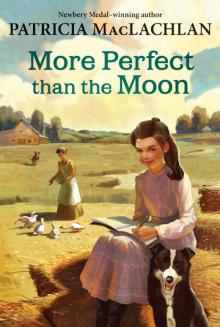 More Perfect Than the Moon
More Perfect Than the Moon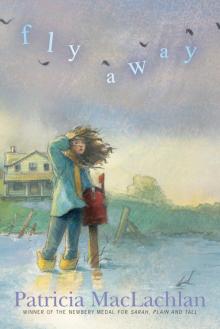 Fly Away
Fly Away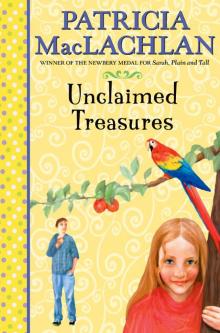 Unclaimed Treasures
Unclaimed Treasures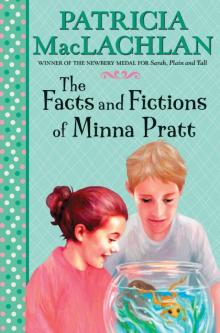 The Facts and Fictions of Minna Pratt
The Facts and Fictions of Minna Pratt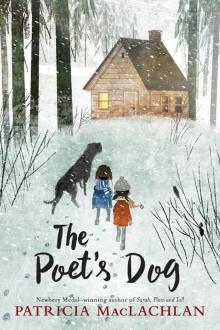 The Poet's Dog
The Poet's Dog Journey
Journey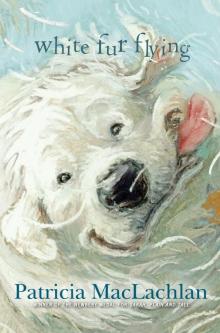 White Fur Flying
White Fur Flying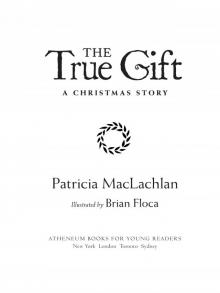 The True Gift: A Christmas Story
The True Gift: A Christmas Story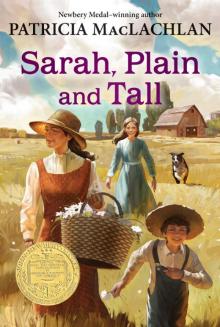 Sarah, Plain and Tall
Sarah, Plain and Tall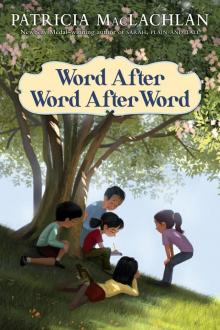 Word After Word After Word
Word After Word After Word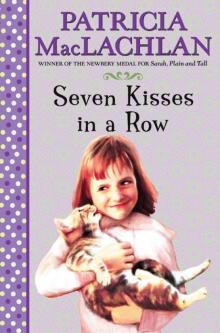 Seven Kisses in a Row
Seven Kisses in a Row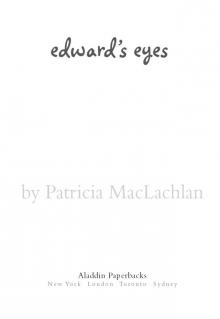 Edward's Eyes
Edward's Eyes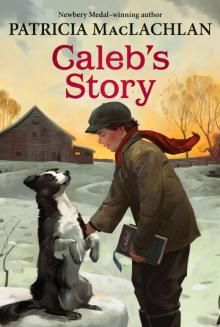 Caleb's Story
Caleb's Story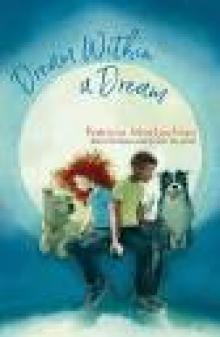 Dream Within a Dream
Dream Within a Dream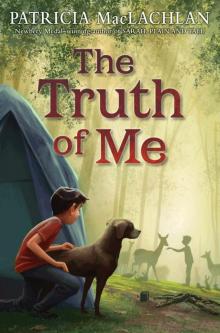 The Truth of Me
The Truth of Me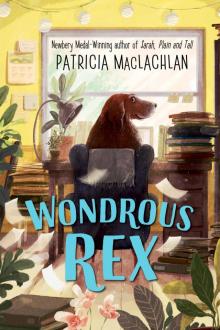 Wondrous Rex
Wondrous Rex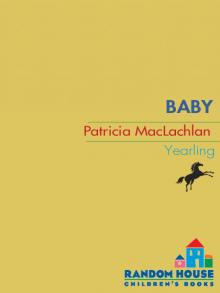 Baby
Baby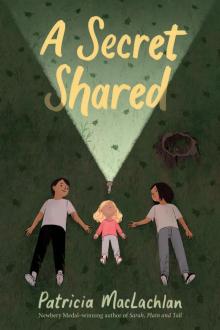 A Secret Shared
A Secret Shared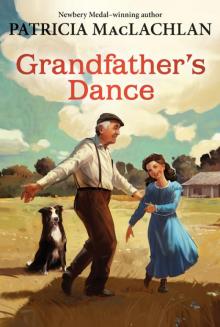 Grandfather's Dance
Grandfather's Dance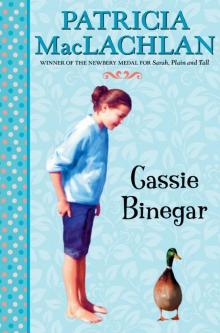 Cassie Binegar
Cassie Binegar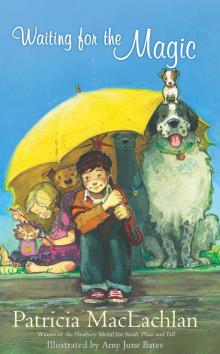 Waiting for the Magic
Waiting for the Magic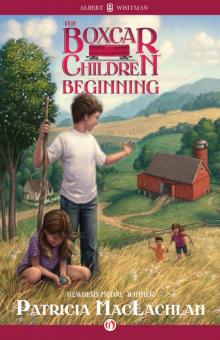 The Boxcar Children Beginning
The Boxcar Children Beginning My Father's Words
My Father's Words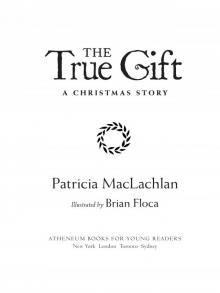 The True Gift
The True Gift